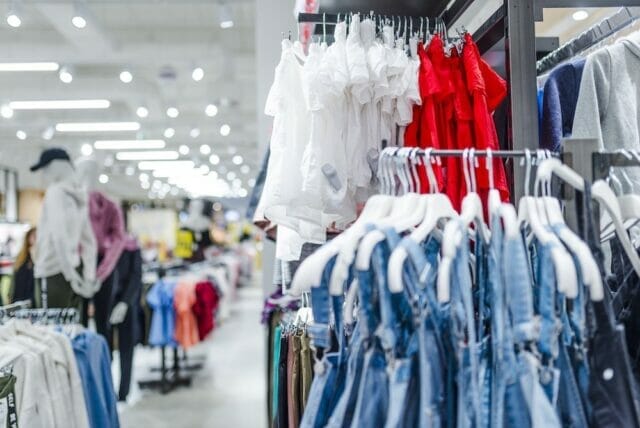
While we often consider sustainability when buying clothing from individual brands, some of the biggest fashion retailers are actually department and big-box stores. But do they live up to the standards of sustainability to which we hold other brands?
Remake has evaluated each of the following stores under their sustainability criteria … and—spoiler alert—none of them passed. Here’s why.
The True Cost of Shopping Big Fashion Retailers
How Sustainable is Amazon?
We know, we know … starting out the list strong with some news you probably don’t want to hear. Two-day delivery may be convenient, but Amazon has a tendency to monopolize markets and crush unions, and they take a weak stance on wages, despite the massive amount of wealth they bring in every single year.
Amazon is also making large contributions to climate change–their carbon emissions grew 19% in 2020, when the rest of the globe was seeing a sharp drop in emissions due to Covid-19. Is the convenience of Amazon clothing worth the damage it does? Our stance is a resounding no. See our article on Amazon Essentials for more.

How Sustainable is JCPenney?
JCPenney has a history of treating their garment makers poorly. In 2013, the Rana Plaza factory tragically collapsed, killing 1,134 workers. Even after this tragedy, they still have not committed to the International Accord on building safety. At the beginning of the pandemic, they canceled $23 million worth of orders from Bangladesh alone, contributing to mass job loss of garment makers.
When it comes to the environment, JCPenney hasn’t made even the most basic commitments toward climate change or water stewardship, showing they care more about profit than impact.
How Sustainable is Kohl’s?
Similar to JCPenney, Kohl’s canceled over a billion dollars worth of orders in 2020, even though many of the products had already been manufactured. Their refusal to pay for the merchandise they ordered caused many of their Bangladeshi workers to lose their jobs. Instead, Kohl’s prioritized paying over $100 million worth to shareholders, showing their disregard for the wellbeing of their workers.

How Ethical is Ross?
Despite being one of the most profitable apparel companies in the world, Ross has faced 67 formal complaints since 2012 from workers saying they were paid less than minimum wage to produce Ross’s clothes. Ross has repaid none of these wages, but they do consistently increase executive salaries and payouts for their shareholders.
At this point, we’re starting to sound like a broken record. Ross is another department store that prioritizes growing the wealth of their top-level executives while exploiting garment makers.
How Ethical is Target?
Another hard-hitter, we know. Even though they make over $20 billion annually in clothing sales alone, Target has made no commitment toward living wages, and they actually belong to an executive committee that lobbied against accountability for companies to pay their garment makers minimum wage. While Target has set environmental goals, they’re underwhelming–like reducing virgin plastic by 20% by 2025–and we’ve yet to see them actually take action.
With the following Target has, we’d love to see them do better … but we won’t get our hopes up just yet.
How Ethical is Wal-Mart?
Like JCPenney, Wal-Mart produced products in the Rana Plaza factory that collapsed in 2013, yet refuses to sign the International Accord and commit to building safety. They also scored zero points from Remake in the category of environmental justice for failing to set a carbon emissions target or make any investment in the communities they use to extract value.
Wal-Mart is the largest retailer in the world–they can absolutely afford to make big changes, and we hope they do … ASAP.

How Sustainable are Popular Clothing Stores Overall?
Amazon, Kohl’s, Ross, JCPenney, Wal-Mart, and even Target fail to be good options for sustainably minded consumers. While none of the above retailers earned passing marks today, we hope they do better in the future.
How Sustainable are Popular Fast Fashion Brands?
It probably comes as no surprise that we avoid all fast fashion brands for their sub-par record when it comes to human rights and environmental practices. We’ve evaluated and failed fast fashion brands including H&M, Zara, SHEIN, Romwe, Boohoo, Asos, Uniqlo, and more. Check out Brands to Avoid for all the dirt.
Use our directory to find 100+ sustainable clothing brands you can feel good about supporting.
We should all care about shopping sustainably–and the good news is that your dollars really do make a difference. By using your purchasing power to support sustainable brands, you’re also supporting brand transparency, the environment, and fair wages for workers.
Here are just a few brands you can shop at with a clear conscience:
- Outerknown, for sustainably-made casualwear
- Kotn, for responsibly-sourced basics
- Thousand Fell, for circular vegan sneakers
- Nudie Jeans, for great fitting jeans with free repairs
- Girlfriend Collective, for activewear, athleisure, and leggings
Is there an online shop for the best eco friendly clothing brands?
For a sustainable alternative to big department stores, check out our shop, where you can browse over 1,500 items from our certified brand. To dress like you give a damn, start here!

Celia Wiseman studied Communication and Creative Writing at the University of Iowa, and her growing interest in sustainable living led her to Eco-Stylist. In her free time she enjoys reading, writing, and making videos, as well as any other activity that allows her to get creative.










1 thought on “Fashion Brands to Avoid: How Sustainable Are Popular Clothing Stores?”
Some of these companies you have listed don’t suprise me at all. Some of their clothes feel like paper, very badly put together.